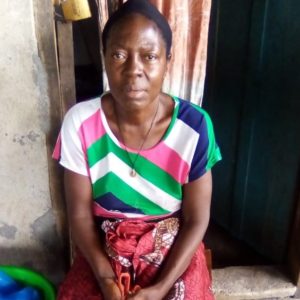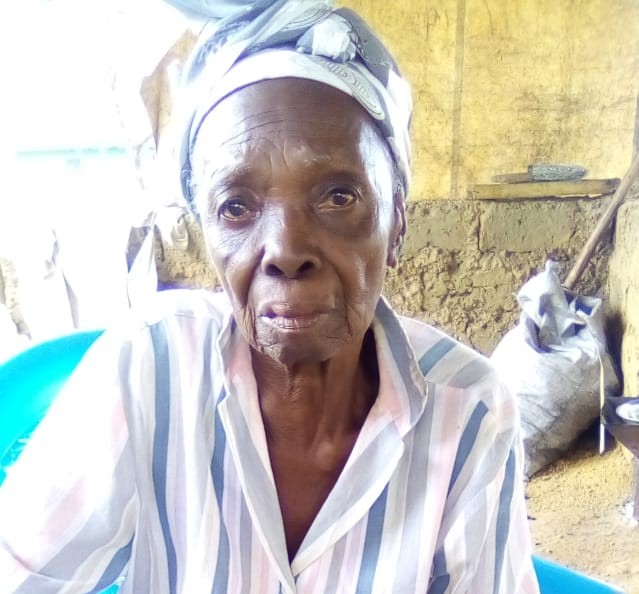PHOTO: Hawa Kromah, now in her 80s, one of the five women sharing their experiences
By Garmah Never Lomo, garmahlomo@gmail.com
In in the Liberian society nowadays, infertility stigmatization has become so recurrent that it is almost like a normal way of life for women facing the issue of bareness. This has caused trauma and even divorce in the worst case scenario for some.
This report, therefore, endeavors to showcase the experiences of five women, with shared infertility stigmatization experience, that they have been struggling to live with; something that has led to some even attempting to commit suicide.
Eighty-year-old Hawa Kromah, who is the oldest of seven siblings, told www.newspublictrust.com that since reaching the age of puberty – the age of sexual maturity and reproduction–she has never conceived, unlike the rest of the siblings. She lost several relationships as a result, she says.
“I was insulted and disgraced publicly by the men I lived with before – from my days as a youth, she said. Ma Hawa has sought both medical and traditional treatments, but to no avail.
For Amie, who’s now in her late 50s, she says no man desires her, simply because of her condition which she has found hard to find solution to.

Amie Seh
“Most often I grieve when I’m alone, especially after being mocked at for being childless,” she narrates as she bursts into tears during the interview.
Despite the odds, she has an abiding faith in God and says often that those deriding her have failed to realize that it is God who gives children and not man.
Madam Seh hasn’t just sat idle with her condition. After several men took disadvantage of her and never considered her a suitable partner, she has sought solutions from both medical and traditional herbalists. But unfortunately, nothing has worked for her so far. She currently survives on charcoal sale to make a living an no partner right now.
She has raised and educated several children, though, some of whom are now in college, while others at the moment live on their own.
Amie Seh’s experience is not unique to her, as previously mentioned. Tonia Massaley, 39, is also grappling with the same problem of infertility stigma. Madam Massaley says being infertile is a condition no one can ever be happy living with, because of the pains of trauma and discrimination and other dehumanizing treatments associated with it.
Madam Massaley added that due to her infertility condition, her husband divorced her in 2010 and entered another relationship with a woman very close to her. According to her, some within the community told her that men will always make fun of her as long as she is unable to bear child for him.

Tonia Massaley
“The most frustrating thing I ever experienced is when a town chief took a woman and gave to my husband and told me that I was a mere decoration in the home,” Tonia recalled. She said that was why he gave her another woman to bear children for him.
According to her, the chief went that far despite not being a relative of her husband. Most of her previous relationships ended after just two years, often over her inability to conceive and give birth.
Despite being barren, Tonia says she has often mustered the courage to encourage women faced with similar situation. She encourages other infertile women to remain steadfast and to know that’s the will of God.

Musu Passawe
Musu Paasewa, 50, is another infertility stigma survivor who figuratively likens infertility stigma to a daily meal, as they face derision on a daily basis.
Even though she has exerted all efforts to bear a child through medical and traditional treatments, nothing has to date happened in her favor.
Madam Paasewa said living without child or children is like having a beautiful hospital without equipment. She said it is difficult to live the condition, especially when seeing other community dwellers’ children and not having one of your own. Currently, her sister’s children live with her and they also help with her domestic chores and other works.
The last of the five persons with similar condition I talked to is Hawa Fofana, 39, married, but without a child.
Like the others, she is stigmatized and treated inhumanely daily for being barren. To make matters worse, she doesn’t get a bit of encouragement, especially from neighbors which would either enable her to keep strong or in finding solution.

Hawa Fofana
Unlike others confronted with infertility, her husband is a great source of support and has stood by her all along, she says. He helps her become more optimistic and to have faith by telling her that one day she will hold her own child and that she shouldn’t lend credence to those making fun of her.
Is Infertility Stigmatization a Human Rights Violation?
The Acting Executive Director of Liberia’s Independent National Commission on Human Rights (INCHR), Attorney Urias Teh Pour answered the question in the affirmative, evoking Article 2 of the International Covenant on Civil and Political Rights.
The protocol, he explains, prohibits discrimination on any grounds. “Additionally, Article 2 of the African Charter on Human and Peoples Rights prohibits stigmatization due to infertility,” Atty. Pour adds.

Atty. Urias Pour
The INCHR official also explained that the Maputo Protocol also calls on state parties to the convention to take corrective, positive measures on those areas where discrimination against women continue to exist.
“Most of these discriminations are tied to traditional practices where women and men who are infertile are accused of some spiritual influence,” he continued.
According to the INCHR Executive Director, some are accused of selling their fertility for money or wealth, while others are accused of being witch craft or involved in the practice of it.
Article 5 of the Maputo Protocol calls on state parties to prohibit all forms of discrimination including those that negatively affect women’s rights and additionally, states are called upon to create awareness regarding harmful practices, Pour said.
Role of Health Workers

Dr. Emmanuel K. Ekyinabah
The role of health workers in curbing infertility stigmatization should center on education for behavioral change, according to Liberia Medical and Dental Council President, Dr. Emmanuel K. Ekyinabah.
He has spoken of the need for public education on people living with the condition, saying that it is comparable to common illnesses like malaria. The scale of infertility stigma, he said, can be attributed to lack of education.
In an interview with www.newspublictrust.com, Dr. Ekyinabah added that people who suffer from infertility should not be held responsible for their infertile condition, because infertility affects both men and women equally.
Dr. Ekyinabah said health authorities in addition to educating the public, can also help in advocating for victims, noting that the public should be in sympathy with victims instead of stigmatizing them.
The only system put in place for now for infertile women and men, he said, is an adoption program at the Ministry of Gender, and Social protection, which he noted is not really proactive, as it’s there for mainly people whose conditions can’t be corrected or reversed through medical means.
Dr. Ekyinabah also disclosed that the country has many trained fertility specialists working with women and men to have the issue of infertility resolved but they have been challenged with lack of equipment to work with. According to him, some of the equipment needed to diagnose infertility are very costly and that ordinary people can’t afford to buy them.
The President of the Liberia Medical and Dental Council wants government to establish fertility hospitals across the country since more doctors have been trained as fertility specialists and some doctors are outside the country currently undergoing training.
He is recommending that such experts be supported by government and international development partners to establish fertility hospitals across the country.
He is also suggesting that insurance companies invest in fertility treatment for their employees, as more insurance companies don’t cover fertility problems. This, he said, weighs in on all; most especially survivors.
Dr. Ekyinabah acknowledged that there is a big stigma associated with childlessness. Such stigma, he said can include being given nicknames and being referred to by all sorts of names wizard and witch, among others.
Because of the stigma, the Liberian medical doctor said, victims of infertility usually don’t share their condition with friends and relatives and even if they visit a health facility, they don’t disclose over fear of being stigmatized.
“They endure such conditions many years without finding solution to their problem,” Dr. Ekyinabah pointed out.
He said some infertility problems can be solved if diagnosed sooner. However he said if the problem can’t be corrected through health means, there are available options. The issue of infertility is something the public really need to know about and should be no secret, he said. Therefore, he is recommending that education be the driving force in the stride to reduce or even eliminate.
“Secondly, there should be a partnership between health workers, Ministries of Health and Gender, development partners and insurance companies in making sure that the country gets fertility hospitals both in Monrovia and in rural places”, Dr. Ekyinabah said.
He said most often infertility problems go unnoticed. He has therefore underscored the need for people to always do regular medical checkup because the sooner the problem is diagnosed, the quicker it can be solved.
Most married couples, he noted, don’t do medical checkup prior to getting married even though it is a basic requirement at the National Archive, Records and Documentation, adding that if testing were being done before marriage, most problems could be diagnosed sooner and worked on. Dr. Ekyinabah named some of the causes of infertility as fabroid, hypertension, chronic urinary tract infection, diabetes, etc.

